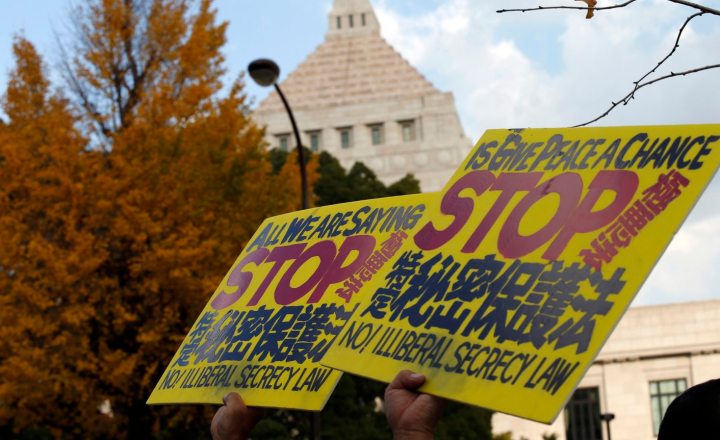World
Japan moves to enact strict secrecy act despite press freedom fears

Japan on Tuesday moved closer towards a law that would expand the definition of state secrets and raise penalties for leaks, a provision critics say will block access to information on sensitive areas, including the nuclear industry. By Linda Sieg and Kiyoshi Takenaka.
Parliament’s lower house approved the state secrets act after Prime Minister Shinzo Abe’s Liberal Democratic Party agreed last week to revisions with small, conservative opposition parties.
Opponents of the legislation say the changes were cosmetic and failed to address basic concerns on civil liberties and the public’s right to know.
The bill now goes before parliament’s upper house, where it is likely to pass without dfficulty.
The LDP and its junior partner have a solid majority in both chambers so winning some opposition backing was seen mainly as a way to ease public concerns about the bill.
According to opinion polls, more voters oppose the bill than back it. Nearly 63 percent of respondents to a Kyodo news agency survey last weekend expressed concerned about its provisions.
Hundreds of protesters demonstrated against the legislation near parliament on Tuesday.
“Clearly, there will be a chilling effect on access to a wide range of information,” said Meiji University law professor Lawrence Repeta.
“It is clearly aimed at news media to block reporting in a way that may be critical of the government on a wide range of sensitive issues,” added Repeta. He, like others, noted the likely dampening impact on whistleblowers.
Under the law, public servants or others cleared for access to state secrets could be jailed up to 10 years for leaks.
Journalists and others in the private sector convicted of encouraging such leaks could get up to five years if they use “grossly inappropriate” means to solicit the information.
Top officials in all ministries will be able to designate special state secrets in four categories – defence, diplomacy, counter-terrorism and counter-espionage – that can be kept secret for up to 60 years and in some cases longer.
NUCLEAR SECRETS
Included among those secrets could be information on the vulnerability of nuclear power plants – of keen interest to many Japanese after the March 2011 Fukushima nuclear disaster which forced some 160,000 from their homes.
“Information on the vulnerability of nuclear power plants could be classified as special secrets, along with plans on how to guard the plants,” said Yutaka Saito, a lawyer and a member of the Japan Federation of Bar Associations’ task force on the bill.
“If so, anyone who has blown the whistle from the inside to warn of the danger of nuclear power plants will be punished.”
Abe’s government says the law is vital to his plan to create a U.S.-style National Security Council to coordinate security and foreign policies and persuade foreign countries such as Tokyo’s close ally, the United States, to share information.
Media, publishers, lawyers and even actors and entertainers have denounced the law, which for some has conjured up memories of Japan’s harsh state secrecy regime before and during World War Two. Thousands gathered in a Tokyo park to protest against the legislation last week.
Critics said concerns about possible abuses of the law remained despite the revisions agreed on with opposition parties. The lack of an independent review process was particularly troubling, they said.
On Tuesday, Abe told a parliamentary panel that the government would take steps to set up some form of third party review body, though details were lacking.
“I don’t see any movement on the central issue. The most central issue is the power of government agencies to designate information as secret,” Repeta said.
“This law is a revolutionary change to expand that power to cover all ministries and agencies,” he said. “It doesn’t ask if the information released caused damage to Japan or whether it should be released because there is a strong public interest.” DM
Photo: A protester holds up placards during a rally against the government’s planned state secrets act in front of the parliament building in Tokyo November 26, 2013. Japanese Prime Minister Shinzo Abe’s government is planning a state secrets act that critics say could curtail public access to information on a wide range of issues, including tensions with China and the Fukushima nuclear crisis. The new law would dramatically expand the definition of official secrets and journalists convicted under it could be jailed for up to five years. REUTERS/Toru Hanai


















 Become an Insider
Become an Insider